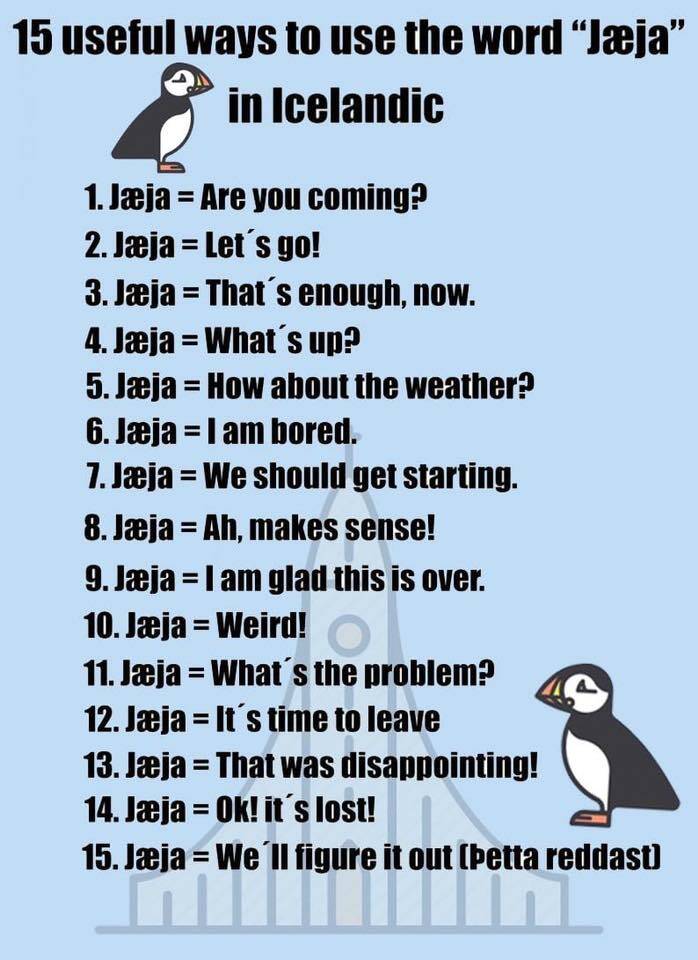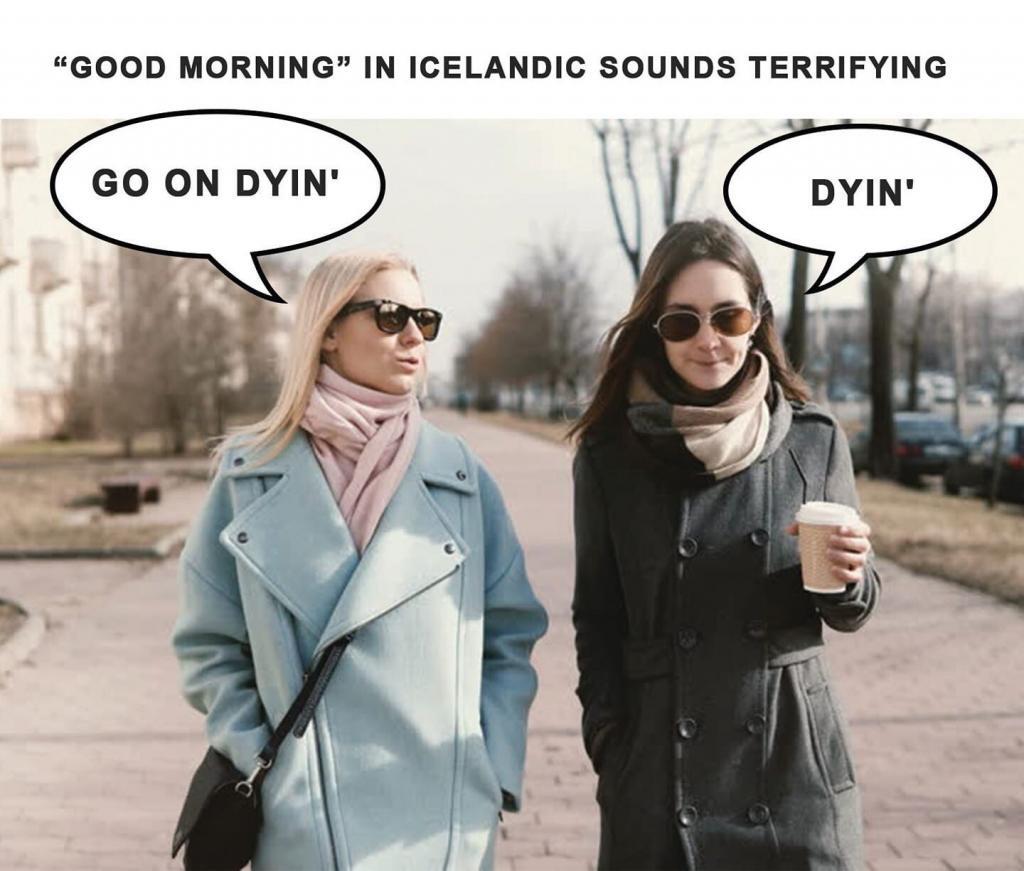Free and exclusive discount codes for hundreds of tours and & travel services in Iceland
Subscribe to instantly receive discount codes for tours, car rental, camper van rental, and outdoor clothing rental. Thank you! ❤️ Jon Heidar, Editor of Stuck in Iceland Travel MagazineThe Icelandic language is perhaps not the most ‘ user-friendly’ language there is. But you are interested; here are some key phrases in Icelandic that might help when traveling to Iceland. I hope this is useful to you when you are planning your trip to Iceland. Let’s start with something simple like ‘yes’ and ‘no,’ ‘já’ and ‘nei,’ respectively.
The most common phrases in Icelandic
The most used phrases in Icelandic are ‘já’ and ‘jæja.’ As I just mentioned, ‘já’ means ‘yes,’ but that word has many meanings. So ‘já’ can be a straightforward yes. However, it can be many other things depending on the context and tone of voice used. For example, It can be an exclamation of surprise. Sometimes ‘já’ is used as a pause word to give the speaker a longer time to think about what to say next. You can be extra affirmative by saying ‘já’ on the inhale.
Icelanders sometimes speak on the inhale, don’t worry, they do not have tuberculosis
Speaking on inhale is common in Iceland and has led some foreigners to think that lounge disease is common in Iceland. That is, of course, not so anymore. If you want to affirm something quickly, you say Já on the inhale. If you are shocked, you might say: “Ég trúi þessu ekki” – ‘I don’t believe it, on the inhale.
Jæja is a word with million meanings
Then there is the word ‘jæja.’ – I don’t have a good translation; the closest thing I have got is ‘there we are’ or something like that. As the picture below shows, the word ‘jæja’ has many meanings.

More resources for learning Icelandic phrases and language
If you want to get an excellent introduction to the Icelandic language and culture, I recommend the All Things Icelandic podcast by Jewells Chambers. You could also use resources on Youtube such as Cool Icelandic Lessons.

I don’t want to learn those phrases in Icelandic
If you are an English speaker and feel a little lazy, you can skip this entire thing and ask the Icelander you want to communicate with: ‘Talar þú ensku?’ This sentence means ‘Do you speak English.’ Most Icelanders speak pretty decent English, even if they tend to overrate their fluency a little bit.
Learn greetings in Icelandic
If you want to be polite, you say please. The closest Icelandic has to that is ‘Vinsamlegast.’
If you are greeting somebody, you say ‘halló which is just a variation of ‘hello’ in English. You can also say ‘góðan daginn’ or ‘good day’ The letter ð is unique to the Icelandic language and is pronounced like ‘TH.’ If you want to say ‘good evening’ you say ‘góða kvöldið..’
When you meet someone for the first time, you want to be friendly and say, ‘how are you doing.’ The phrase is ‘hvernig hefur þú það’ – the letter ‘þ’ is also unique to the Icelandic language. Its pronunciation is close to ‘th’ in English.
Saying goodbye in Icelandic
If you are saying goodbye, you say ‘bless.’ The phrase ‘góða nótt’ is used when you want to say goodnight to someone.
Express gratitude in Icelandic
When thanking somebody for something, you say ‘takk,’ Icelandic for thank you. I would go as far as to say that this word is the most useful in the Icelandic language. I use it as much as possible because showing gratitude is the best way to get along with my fellow human beings. It is also a tremendously powerful way to get things done.
If you want to respond to somebody thanking you, you can say ‘ekkert að þakka.’ which is the Icelandic phrase for ‘you are welcome.’
Getting somebody’s attention
If you want to be extra polite when getting somebody’s attention, you can say ‘afsakið mig’ or ‘excuse me.’
Saying sorry in Icelandic
If you want to express regret, to say you are sorry, you will say ‘afsakið.’ Hopefully, you will have nothing to be sorry about!
What to say when you don’t understand something?
What to do when you don’t understand something? In this instance you say ‘Ég skil ekki.’ You may also say ‘ha?’ which is probably easier to remember!
Ordering coffee in Icelandic
You will be fine asking for coffee in English at most cafés. Indeed, I think you will often be hard-pressed to find native Icelanders serving coffee. But if you want to try Icelandic, you say: “Get ég fengið kaffi?”
Ordering beer in Icelandic
Just as with coffee, you will not have any difficulties asking for a beer in Icelandic. But say if you want to order a single large beer, you will say: ‘Einn einn stóran bjór, takk?’ If you want two large beers, you say: ‘Tvo stóra bjóra takk.’

